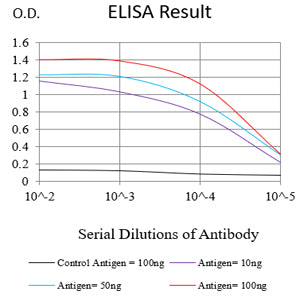
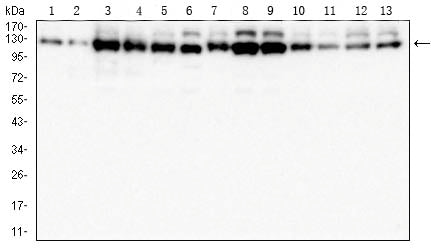
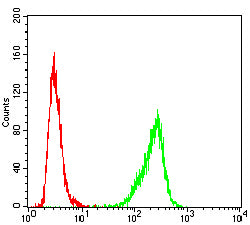
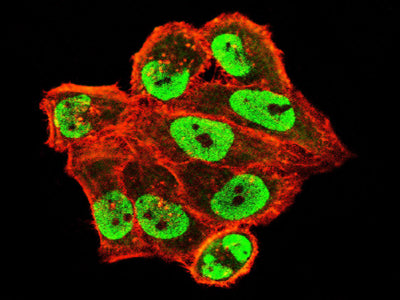
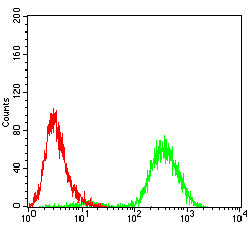
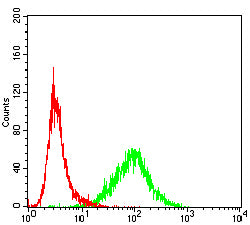
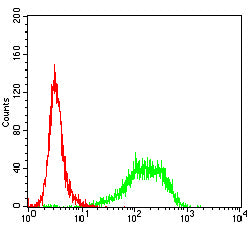
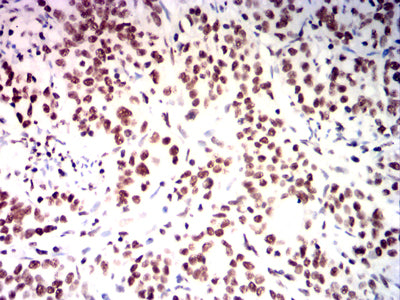
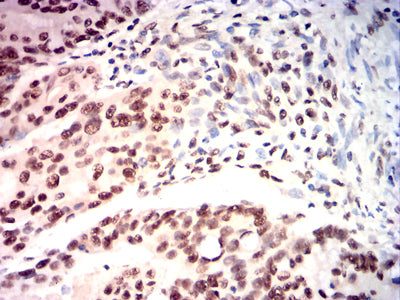
| WB | 1/500 - 1/2000 | Human, Mouse, Rat, Monkey |
| IF | 咨询技术 | Human, Mouse, Rat, Monkey |
| IHC | 1/200 - 1/1000 | Human, Mouse, Rat, Monkey |
| ICC | 1/200 - 1/1000 | Human, Mouse, Rat, Monkey |
| FCM | 1/200 - 1/400 | Human, Mouse, Rat, Monkey |
| Elisa | 1/10000 | Human, Mouse, Rat, Monkey |
| Aliases | TEF1; HAUSP; HAFOUS |
| Entrez GeneID | 7874 |
| clone | 2A1C6 |
| WB Predicted band size | 128kDa |
| Host/Isotype | Mouse IgG2b |
| Antibody Type | Primary antibody |
| Storage | Store at 4°C short term. Aliquot and store at -20°C long term. Avoid freeze/thaw cycles. |
| Species Reactivity | Human, Mouse, Rat, Monkey |
| Immunogen | Purified recombinant fragment of human USP7 (AA: 1-208) expressed in E. Coli. |
| Formulation | Purified antibody in PBS with 0.05% sodium azide |
+ +
以下是关于USP7抗体的3篇代表性文献,涵盖其功能、相互作用及研究工具:
---
1. **标题**:*USP7/HAUSP Binds and Deubiquitinates p53 to Promote Its Stability*
**作者**:Holowaty, M.N. 等
**摘要**:该研究利用USP7特异性抗体,通过免疫共沉淀证实USP7直接结合肿瘤抑制蛋白p53.并通过去泛素化作用稳定p53水平,揭示了USP7在DNA损伤应答中的关键调控机制。
---
2. **标题**:*USP7 Regulates the Stability and Function of HDAC6 through Deubiquitination*
**作者**:Jentsch, S. 等
**摘要**:通过Western blot和免疫荧光技术,研究者使用USP7抗体证明其通过去泛素化调控HDAC6的稳定性,影响细胞迁移和微管动力学,为癌症转移机制提供了新见解。
---
3. **标题**:*Structural Basis for USP7 Inhibition by Small Molecule Compounds*
**作者**:Khoronenkova, S.V. 等
**摘要**:该文献报道了利用USP7抗体进行蛋白结构域定位分析,解析了USP7催化结构域的三维构象,并筛选出选择性抑制剂,为靶向USP7的抗癌药物开发奠定基础。
---
**备注**:上述文献中,USP7抗体被广泛用于验证蛋白表达、定位及相互作用研究,是探索其生物学功能和药物靶点的重要工具。如需具体文献来源,可进一步在PubMed或期刊数据库检索标题获取全文。
USP7 (Ubiquitin-Specific Protease 7), also known as HAUSP, is a deubiquitinating enzyme critical for regulating protein stability and function by removing ubiquitin moieties from target proteins. It plays a central role in diverse cellular processes, including DNA repair, epigenetic regulation, immune response, and apoptosis. USP7 is particularly notable for its interaction with tumor suppressors (e.g., p53. PTEN) and oncoproteins (e.g., MDM2. viral proteins), making it a key player in cancer biology, neurodegenerative diseases, and viral pathogenesis.
USP7-specific antibodies are essential tools for studying its expression, localization, and molecular mechanisms. They are widely used in techniques like Western blotting, immunoprecipitation, and immunofluorescence to investigate USP7’s role in substrate recognition, post-translational modifications, and pathway modulation. High-quality USP7 antibodies must exhibit specificity to avoid cross-reactivity with other ubiquitin-specific proteases (e.g., USP5. USP13) due to structural similarities within the USP family. Validation via knockout cell lines or siRNA-mediated depletion is critical to confirm target specificity.
Research on USP7 antibodies has accelerated drug discovery efforts, as USP7 inhibitors are being explored for cancer therapy and antiviral treatments. Reliable antibodies help dissect USP7’s dual roles in promoting or suppressing disease, depending on cellular context, underscoring its therapeutic potential and complexity as a biological target.
×